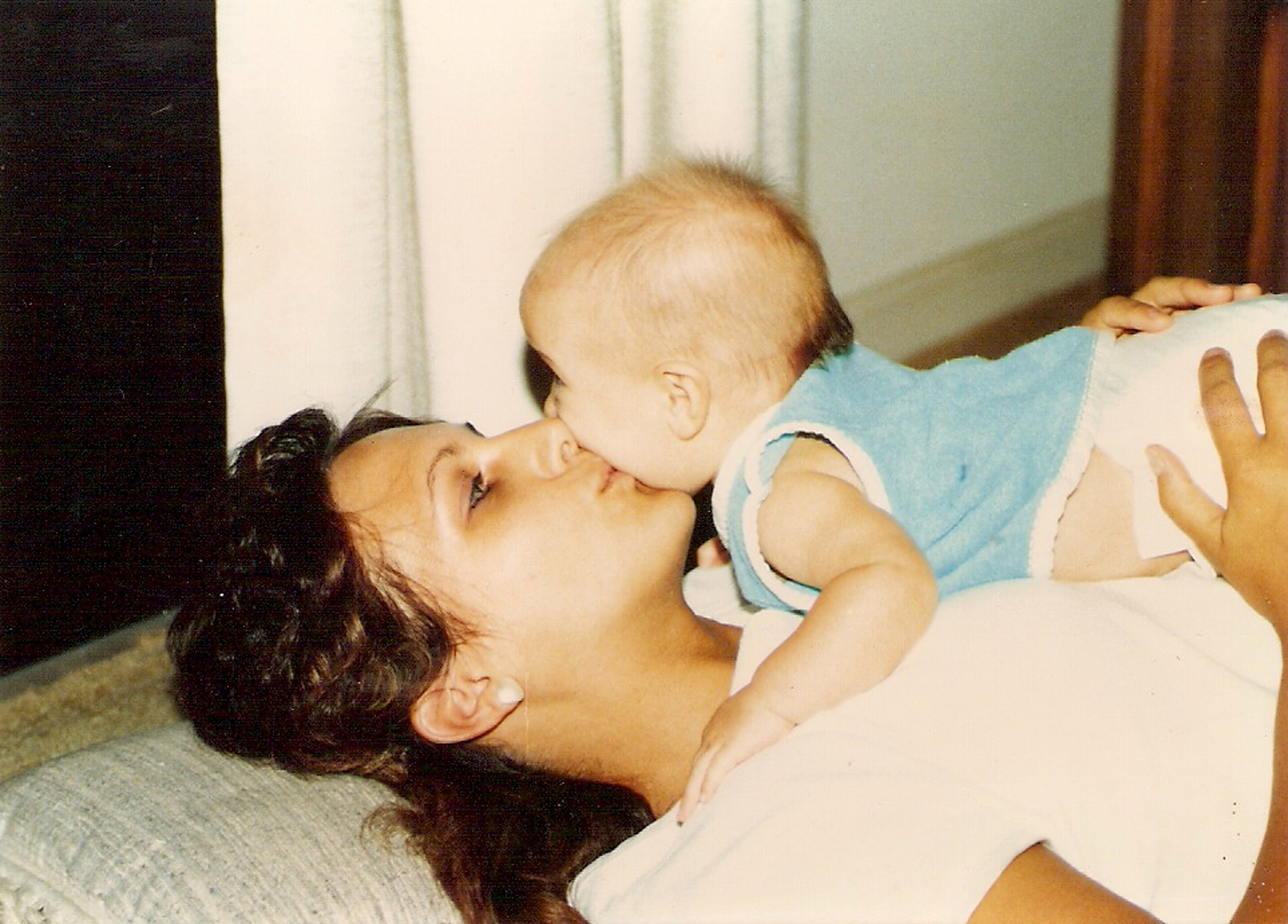set bound with your parent can improve your kinship so we asked healer to share pragmatic advice for how to have these conversation .
Settingboundarieswith your parents as an adult is n’t always easy . But it may be necessary for your own well - being and the wellness of the relationship .
Know that boundary are foryou . They’rea way to respect yourselfand honour your motivation . They ’re not about control other people — in this case , your parent .

AsAllison Hart , a psychological associate atWellspace SFtherapy practice , put it , boundaries “ draw your behaviour , what you will do or how you will be when someone span them . ”
“ A bound is not telling someone they ask to vary , ” she told HuffPost . “ It ’s changing your relationship to someone or their behavior ” when their actions are compromising your wellbeing .
big tike often worry that if they set boundaries , they might jeopardize their relationship with their parent .

“ It ’s a terrific mentation to lose our parents , ” saidKate Stoddard , a wedding and family healer at Wellspace SF . “ However , what is lost from not trying to make a dynamic that is actually healthy ? You may be living with this veneration of loss , doing thing out of guilt feelings that you do n’t want to do and then feeling resentful , or feel controlled or beholden to others . ”
We all have unlike circumstance , histories and current relationships with our parents , so keep that in nous when suppose about what limit to adjust and how to set them .
“ It ’s important to put any of these conversations into the context of your life and the full circumstances at playing period , ” therapistJor - El Caraballo , Centennial State - founding father of the mental health and health practiceViva , told HuffPost .

If your parent are venerating , uncoerced to mind and receptive to feedback , boundaries canbe dim-witted , slack guidelines . Other metre , they may need to be more fixed , concentrated bound .
“ In either billet , it ’s important to receipt what works best for you , ” Caraballo said . “ Consider how you may communicate your concerns in a way that is understandable to someone else , even if they do n’t like what you have to say . ”
We ask therapists what boundaries grownup children might want to set with their parents . Below they portion out the 1 you should consider and offer practical advice on how to have these conversations .

Boundary #1: No commentary about my body.
Unfortunately , it ’s not rare for parents to notice on their child ’s body cast or sizing throughout their living and into adulthood . These remarks incline topop up more around the holidaysor anytime it ’s been a while since you ’ve last ascertain each other .
It ’s understandable if remarks about your soundbox get under your skin . And it ’s valid to need to put a halt to them .
“ You do n’t have to tolerate it , no matter your size , ” Caraballo said .

What to say:
You might respond,“I’m not interested in talk about my appearance,”and then switch the issue to something more interesting . If you make love they meant it as compliment , you could acknowledge that upfront and then say you ’d still choose your body not be a topic of conversation .
If you require to fix a firmer boundary , you might say : “ What you ’re saying — or suggesting — decent now is hurtful , ” Caraballo said . “ If you ca n’t stop talking about my body or feeding habits , then I ’m run to have to leave behind this conversation . ”
Boundary #2: Limits on conversations about my money.
When you ’re financially independent , hearing your parent ’ opinions about how you deal money can be thwarting . Their concerns may occur from a good situation : They just desire to see you ’re financially unchanging . But as an grownup , you should n’t sense obligated to listen their advice or apologise your spending habits or money decisions to them .
prove saying something like , “ I understand you ’re interested for my hereafter and want the dear for me . I ’m comfortable with how I ’m handle my money and the plans I have for my life story , ” Caraballo suggested . “ I do n’t desire to discuss this further . ”
If your parent still wo n’t drop it , you’re able to append : “ I ’ll absent myself from any further unasked conversation about it , ” Caraballo lend .

Boundary #3: No digs about my about career choices.
Some parents pressure their children to follow a certain professional course — one they believe is more stable , lucrative or revered .
“ Usually the boundary - pushing and unsolicited advice add up from an anxious parent wanting the best for a child , ” Caraballo said . “ This can produce an incredible amount of pressure and anxiety on a tiddler , which can be hard to trade with . It may even potentially leave them feeling never good enough or wrong for pursue thing they think fit them well . ”
conceive saying something like : “ I can appreciate you are interested about my future and my path , ” Caraballo paint a picture . “ At the same time , this is my life and I have to make decisions that solve best for me . I ’d apprize your support . And if that ’s not possible , then I ’d revalue your silence on the matter . ”

Boundary #4: No unsolicited advice in general.
Clinical psychologistRyan Howessaid that among his clients , he sees an overarching pattern of parent offer unasked advice to their kid across a turn of topics : their jobs , relationships , parenting choices , money direction and unearthly practices , to name a few .
“ This may be coming from a well - meaning place , or their anxiousness , or distrust in the grownup child ’s abilities , ” he said . “ irrespective of the origin , it ’s often met with annoyance or strong anger from the adult child , which is a sign of a boundary encroachment . ”
If you want their guidance , you ’d say so . When you get advice you did n’t ask for , it can be annoying or even hurtful .

“ The adult small fry can feel like they ’re being criticized , treated like a nipper , or viewed as incompetent , ” Howes say . “ Interestingly enough , this often come from the parent ’s fearfulness that they did an inadequate chore of fit out their child for maturity . ”
Gordie Howe provided a possible script for address this bound : “ Thank you for put forward me to be a convinced and responsible conclusion - Jehovah , that was a wonderful gift . As a resultant , I ’m now able-bodied to make my own choices and accept the consequences , regardless of the outcome . I wo n’t bear you responsible if my decisiveness bend out poorly , I ’ll just learn from my mistake . If I need some advice from you , I ’ll be sure to ask for it , but if I do n’t , permit ’s take on the advice is n’t wanted . ”
Boundary #5: No gossiping about our family members.
Parents will sometimes talk ill about or divulge private information about a relative or another one of their adult kid — even when that information is n’t theirs to disclose .
This is common “ specially if the sibling did n’t last up to the parents ’ expectations or if they are process as the family scapegoat , ” Hart said .
“ If you were raise in a family where prize your parents meant your tactile sensation and thoughts were dismissed , where silence was expected when the parent was make a mistake or make pain to others , or you were punished by them remove love for and link to you when you advocate for you or your phratry members , then setting this bounds can experience very uncomfortable , ” Hart tell .

“ Remember that if you do n’t agree with that definition of respect , you do n’t have to play by those rules anymore . ”
If you desire to draw a boundary here , you could strain one of Hart ’s suggestions : “ This conversation makes me uncomfortable and I wo n’t enter in it , ” “ I ’m not going to talk about someone in the family unit when they are n’t here to partake in their point of view , ” or “ This is not our information to share so I ’m go to condone myself . ”
If these fathom like very fledged things to say , it ’s because they are , Hart said .

“ But as adults sometimes we [ still ] palpate like children around our parents , so even think order these thing sounds like we are ‘ out of line , ’ ” Hart say .
Boundary #6: No more trying to “fix” each other’s emotions.
This is another fundamental boundary that can practice across a issue of different situations : “ I am not going to seek to supervise your emotions or control your feelings with my behaviour — nor will you do that for me , ” Stoddard said .
“ This intend we get to allow our parent to have negative emotion and not prove to fix them or take them away , or do what they desire us to do to make them finger better , ” she explain . “ We all get to experience disappointment , anger , thwarting , overwhelm and disordered without having to ask someone to do something to make it go away . ”
you may listen to and acknowledge your parents ’ feelings , but it does n’t mean you have to do something you do n’t want to do just to make them feel better , Stoddard said .

Stoddard offered this supposititious scenario : countenance ’s say you tell your parents you are n’t flying home for the holidays this year . They might say they ’re hurt by this decision and essay to guilty conscience - stumble you into coming by say : “ How could you not number home to impose us for Christmas ? We have n’t seen you in forever . It feels like you do n’t worry about us at all anymore . ”
Normally , you might be so unsettled by your parents being upset with you that you ’d reserve a flying domicile anyway to attempt to smoothen thing over .
But if you were trying to harbor this boundary instead , you might say , “ I completely hear you and understand that this decision might feel hurtful towards you , ” Stoddard suggested . “ The Sojourner Truth is that our vacation visits have been really punishing on me , and it would be beneficial for me if I did n’t visit this yr . I really do care about you both and think this will be good for our relationship right now . ”

Let ’s say the reason you ’re not spend the holidays with your parent is because you have program with your partner ’s family line this class . But the pushback from Mom and Dad is the same : They feel like you do n’t care about them and feel cold-shoulder by your decision .
Again , you might start by validating their feelings , saying you’re able to see how this might be disconcerting to them . Then you could say , “ The truth is that it ’s really important to me to get to know my boyfriend ’s family , and it would be beneficial for me if I did that this year , ” Stoddard suggested . “ I actually do care about you both and this decision has nothing to do with how much I love and deal for you . ”
Boundary #7: Don’t assume we’ll do things the way we always have.
“ When a nipper becomes an adult and starts wee their own choice , the saying , ‘ but we ’ve always done it that mode ’ no longer automatically applies , ” Howes said .
Perhaps , growing up , your family convey a holiday to the same spot every August . But with your limited PTO , you ’d prefer to pass that time off volunteering . Or perhaps you visited your parents every Sunday for dinner for years and year . And now that you have Kid , you ’d rather occasionally spend the twenty-four hour period at your own house instead of driving back and forth to Grandma and Grandpa ’s .
“ The problem here is the presumptuousness that affair will and should quell the same as they were when they were youngster , and many hurt feelings can arise from this presumptuousness , ” Howes said . “ The tonality is to have an exposed , reliable treatment that acknowledge that setting have changed and we need to put across our want and needs become forward . ”

You could severalize your parents : “ I really appreciate the many good times and memories we ’ve had from the past days , ” Howes said . “ meter have exchange , though , and this relationship is now made up of adult instead of parents raise children . have ’s talk about what changes , if any , we ’d like to make about how we handle holidays , vacation , advice and contact with one another to avoid stepping on each other ’s toe in the future . And countenance ’s keep this as an open give-and-take , because thing will continue to convert . ”
If the above boundaries don’t apply, here are some boundary-setting tips for other situations:
Everyone ’s family dynamic is dissimilar and there are other edge you may consider mark . Here is some general direction you may apply to whatever situation you find yourself in .
Don’t over-explain yourself.
Hart tells her clients to consider their parents ’ limitations and their story together when broaching these conversations . Some parent may be up to of a more in - deepness conversation , while others may not be . In the latter case , a simple , straight - to - the - pointedness statement might be the best course of action .
Here are a few Hart suggested to keep in your back pocket:
“ I usually tell my client to start with less selective information , the bare minimum , and it ’s only once a parent shows that they are psychologically safe and trusty , they can enlarge if they choose to , ” Hart lend .
Try to be patient with your parents — within reason.
“ They come from a different generation and may not even name with the same ethnic norms as you , ” Caraballo said . “ This can be particularly true for people of color who have to navigate acculturation effect as well as generational difference . ”
essay to be compassionate with your parents , if you ’re capable to be . It will make boundary - set more productive , Caraballo said , “ as the ultimate goal is to be able to love as much clip together as possible . ”
Assume repair is possible.
When setting boundaries with family , it ’s “ well to leave a phone line of communication open , if the person is willing , ” Stoddard said .
Even if the initial conversations do n’t go well , hear not to suffer Bob Hope for the future of the relationship .
“ I think it ’s always better to sham that haunt is possible than to arrogate you have to cut someone out of your life , ” Stoddard said .
But if you need to take a step back from the relationship, that’s OK, too.
If you ’ve tried work thing out with your parents to no help , then you may look at distancing yourself and decrease contact . We all have our limits and it ’s o.k. to observe those .
“ We do n’t recognize this in the public sphere a lot , but it takes a muckle for an grownup kid to go no - contact with their parents , ” Caraballo said . “ Sometimes it is necessary , and as intemperately as it can be to do , it ’s a valid path of natural process when a parent unendingly harms you with their Word or actions . ”
Consider working with a therapist.
In some cases , set boundaries with your parent can be “ very abominable and very challenging , ” Stoddard tell . She recommends working with a therapist especially if you ’re dealing with unmanageable kinsperson kinetics or injury .
“ Having a kinship with a family fellow member jailbreak due to boundary - setting is a possibility and it can be traumatizing , though sometimes very necessary , ” she say . “ And it ’s important to have a healer help you voyage the summons . ”This article to begin with appeared onHuffPost .